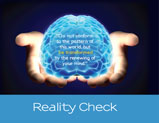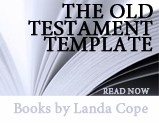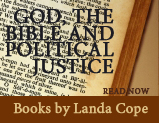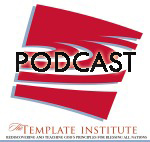Gud, Bibelen og politiske Justice: Kapittel 7
Part Two: Moses og den normative Law
Kapittel 7
The Template of Laws
Nowhere does the Law weave the values of the Kingdom more delicately and beautifully than when applied to public justice. It is so intricate that it is difficult to know which value thread to begin with in unweaving it. There are innumerable ways to look at and analyze what God is giving us in these passages. For our purposes in this volume on government and civil law I am using a matrix of three categories of crime: lose of life, bodily harm and lose of property and four categories of consequence: death penalty, life sentence, restorative and punitive. With these categories we can look at all that the prescriptive law stipulates as crime.
Jeg ser for studiet av Skriften som mentalt unweaving gjengene på en utsmykket veggteppe for å forstå de delene som utgjør helheten. Trådene ikke stå av seg selv; only together do they produce the picture. But the threads are the foundational parts of the whole and lay out the grid work that makes the tapestry possible. Som reverse engineering av flat box møbler, vi tar hele Skriften fra hverandre og finne ut elementene Gud vektlegger for å forstå det og gjøre det enklere å montere den tilbake i våre liv.
I Mosebok kapittel en, God initiates a revolutionary idea to curb man’s great appetite for violence and injustice. God makes the human race responsible for governing themselves. They will choose their leaders. They will choose the laws and they will choose consequences for breaking those laws. God will give Israel His thoughts on these subjects but the authority will be theirs to maintain or change their direction. Konsensus, representant, bunnen opp politisk makt er født.
Husk så vi gikk gjennom Genesis, konsekvensene av synd, atskillelse fra Gud, er død ... alltid. We all die physically because sin came into the world. As God continues in Genesis He hammers home the fruit of sin is death. We begin with brother killing brother and continue until the entire human race is so violent, that human life is endangered entirely. The flood and rebooting of human existence through Noah are God’s just and merciful option. But again man’s decent into violence in Abraham’s family is so rapid that in just three generations they have moved to near fratricide of Joseph and genocide of the Shecemites. A 435-year generational sentence is imposed on Israel as a nation in order to create an understanding of the value of human life.
Now God liberates and gives Israel the Law. The prescriptive parts of the Law are very clear. In essence God is saying, hvis du visste hva jeg vet, du ville «rense denne onde" fra samfunnet ditt, fordi disse er de tingene som vil føre til økende vold og tap av liv; kjønn, misbruk av makt og grådighet.
Med andre ord, i loven, Gud forteller oss klart hvordan å skape trygge, life sustaining communities and making us responsible to do it. The burden of justice is now on our shoulders. We are free to change the laws God has given and we are free to evaluate the consequences, the fruit of our choices. Are we stopping violent deaths of our fellow citizens or is it increasing? Is our mercy succeeding where God’s has failed us? Hvis ikke, noe må være galt med våre valg.
Civil Law vs. Moral Law
For å tolke lover Moses og Israels historie i våre aktuelle hendelser vi må forstå forskjellen mellom to gudgitte myndigheter, myndighet av "sivil lov" og at "moralsk lov."
All "lov" er moralsk i den forstand at det står, “this is right and this is wrong.” In setting a standard of “acceptable behavior” we must make judgments of what is “good or bad.” But not all “morality” can be made a matter of civil “law.” By giving us responsibility to decide God makes us look at the implications of our choices by the impact on the society we live and raise our children in. Sivilrett, representerer folket, will never be more moral than the majority of the people it represents. Men, a more moral people will seek a higher level of civil law. There in lies the tension between the work of the Pastor and the work of the President.
Both civil and moral laws are given authority from God. But they are two different kinds of authority with two different functions. One must have the will of the people behind it in order to have the power to govern. The other must have the will of God behind it to have authority and the blessing of God. One reveals the standards of the people and the other reveals the standards of God. One must seek the support of the people or to change the thinking of the people in order to have authority. The other must ignore the thinking of the people and represent God alone in order to have authority. They are divinely disagreeable in the purposes of God. And we must have both to keep the Kingdom tension of justice in human society. Civil law must be continually committed to keeping the rights of both safeguarded. Dette er dilemmaet og guddommelig spenning.
Mal
The Law seems like a maze in part because of its circular story telling style. We see themes rotating and weaving throughout but they are difficult to grab hold of. Fordi jeg er dyslektiker er det viktig for meg å bestille informasjon for å beholde den. Så jeg brukte farge for å hjelpe meg igjen i denne studien av loven som jeg gjorde i studiet av domener i den innledende Volume. I divided out the prescriptive parts of the Laws of Moses. Those parts of the Law that tell us to “do this but do not do this,"Som 10 bud. Disse "normative" deler er funnet i Exodus, Tredje Mosebok, Tall og Mosebok. Deretter begynner med Mosebok fordi det anses av jødiske og kristne lærde å være den "core bok,"Jeg tildelt hvert tema i den normative loven en farge når den dukket opp i min lesning og fra da brukt den samme fargen hver gang det emnet dukket opp igjen. Når jeg hadde brukt Mosebok å legge ned mønsteret jeg så var i stand til å se hva Gud understreket eller lagt til disse temaene i de tre andre bøker av loven.
Fem Verdier
Til min overraskelse, Jeg fant ut at hele prescriptive loven bygger på fem kjerneverdier som gjentas og støttet i ulike situasjoner og innenfor ulike myndigheter. Her er de fem verdiene:
1. Livet er hellig.
2. The material world is real, god og viktig for alt liv.
3. Ord har makt og vi er ansvarlige for dem.
4. Alt trenger og er innløses.
5. Any thinking that takes us away from God’s truths and values will begin to curse (vil ikke velsigne) oss. (Avgudsdyrkelse)
Selvfølgelig hver av disse verdier støtter den første: "Livet er hellig." Og så alle av dem kan være oppgitt som "Livet er hellig, derfor ... "
Fem Forutsetninger
I kapittel fem la vi ned fem forutsetninger som Guds rike bygger på. Dette er realitetene Skriften forutsetter:
1. Gud er og er som han sier han er.
2. Gud er skaperen av materialet universet, synlige og usynlige, og det er god.
3. Menneskelige individer, mannlige og kvinnelige, er skapt i Guds bilde og hans sentrale formålet for all skapelse.
4. Alt som Gud har skapt er skadet av syndefallet og synd.
5. Alt som er skadet kan løses gjennom Kristi blod.
I think most can see the similarities between the five values of the Law and the five assumptions that all of Scripture is built on.
Institutions of Authority
In chapter four we looked at four institutions of authority created by God:
1. Individuell
2. Familie
3. Regjeringen
4. Kirke[1]
The sovereign individual, created in the image of God is the foundational building block of the Kingdom. The sovereign family of husband, wife and children, is crucial to the development of healthy and mature individuals. The sovereign government, bemyndiget av folk som blir styrt er ansvarlig for å definere og håndheve Guds delegert myndighet, rights and responsibilities. And finally the sovereign Church is responsible to rightly represent God and His standards.
Hver av disse "institusjoner" er gitt en form for myndighet, jurisdiksjon, grenser, rettigheter, freedoms and responsibilities. These lay the foundation for and the value base of civil law. These values do not perfect human beings or societies but, til nivået de er etablert og forsterket, they will create and sustain a more blessed society. These values and the institutions when applied reveal God to the human community. They work with the Cross to reveal Christ the King but they do not substitute for forgiveness and salvation through Jesus. They reveal the Kingdom that is coming but they cannot perfect that Kingdom on earth. Established and used properly these values produce a higher quality of life in all areas of life but they will not finally perfect man or creation.
Vi begynner å identifisere de grunnleggende byggesteinene i Guds rike og bibelsk tanke. De overlapper, veve og gjentar seg selv om og om igjen gjennom hele Skriften. Vi må likevel legge temaene profetene og de nytestamentlige forfattere, but the grid is taking shape. We have five assumptions on which God builds all His thinking. Five values that are essential to uphold if these assumptions are true and four institutional authorities that God gives us in order to preserve and perpetuate these truths and values for the purpose of blessing our lives and our communities.
Tension
Disse bibelske realiteter sette opp en "spenning" av frihet, rettigheter og plikter som må vedlikeholdes for å opprettholde "riktig rekkefølge" eller "rettferdighet" og bygge sunne individer, families and communities. They cannot be “balanced.” They must be mutually maintained.
Picture a tight rope. In order to be traversed it must be rigid. If there is any give at all the consequences can be catastrophic for the walker. This is far more consequential than a set of scales that are just a few grams off. The acrobatic artist cannot survive a slack rope. He can only perform when there is perfect tension on the rope.
In political justice if we error in one direction or the other we distort God’s order in His Kingdom. God has made the individual free and sovereign. Men, siden det er sant for hver enkelt, there are limits to freedom of any single individual. In order for every individual to be free there have to be limits to all of our freedoms. Who has the right and responsibility to create and sustain those boundaries? God has created the family as the authority for and over children. The authority of parents is loving their children. If they are trying to murder their children they are in violation of the sacredness and rights of the individual life. I have the freedom to believe what I like. Do I have the freedom to practice that freedom anywhere anytime any place? If I believe in human sacrifice for my blessing do I have a right to do it? Or is this an abuse of the sacrifice’s rights? Do we have rights as communities? How do we secure minorities rights, rettighetene til foreldre og barn, and the freedom of faith while not destroying the rights of the community?
In every legal issue we are asking these questions:
1. To whom has God given what rights and responsibilities?
2. What are the limits of those rights?
3. How are violations of those rights to be dealt with?
Every system of governance has answers to these questions or is working on them. But are they Biblical answers? We can know what God says about each question and we can know, at any given time where our nations laws and system of governance are blessed or in danger, this is the Biblical Template. But we must be willing to exchange the thinking of the world even when it has been called “Christian” and replace it with God’s thinking, selv når det kalles "verdslig".
Arbeide malen
Hvis vi spør Bibelen spørsmålet, "Hva betyr å elske min nabo ser ut som?"Vi kunne se på de ti bud. Hvis vi spør, "Hvorfor er disse ti bud viktig og hvordan søker jeg dem?"Vi ser på hele loven for detaljer. Hvis vi spør, "Hva ville skje med et samfunn hvis vi søkt eller flyttes vekk fra disse verdiene?"Vi ser på profetene. Og hvis vi spør, "Hvordan kan et samfunn begynner å bevege seg bort fra Guds tenkning?"Vi ser på historien til Israel i Loven og resten av Det gamle testamente.
For vårt formål i denne boken, vi ser på den normative og historiske loven som de forholder seg til sivil lov og rettferdighet, prøver å trekke ut hva som er vektlagt. Men for utviklingen av vår tenkning må vi se dem som integrert og vevd. Så, i kraft, vi "dissekere" til analysere og sette dem sammen til forstå og anvende.
For eksempel, den normative loven sier at utroskap er ulovlig og straffes med døden. Men historisk sett ikke brukes når David begått ekteskapsbrudd med Batseba. Hvorfor? Hadde de bare ikke anvende loven? Eller, var det mer til "the Law" enn bare forbudene? Var det rett av folket til å ratifisere og endre sivilrett del av hva verdiene av "the Law" sikret? Da fariseerne bringe Jesus en kvinne som var grepet i hor, og oppfordrer ham til å steine henne i henhold til Moseloven. Jesus oppfordrer dem til å steine henne hvis deres rettferdighet vil tillate dem å stå som dommer. Under romersk lov utroskap var ikke ulovlig, og hvis de hadde steinet henne at de ville ha blitt funnet skyldig i drap. Kanskje dette var deres plan for Jesus. He then dismisses the women with the exhortation to “sin no more.” Adultery is still immoral.
[1] It is very tempting to make this list five as well by adding “God” from who all authority and power comes. The author is resisting the temptation to numerical perfection.







